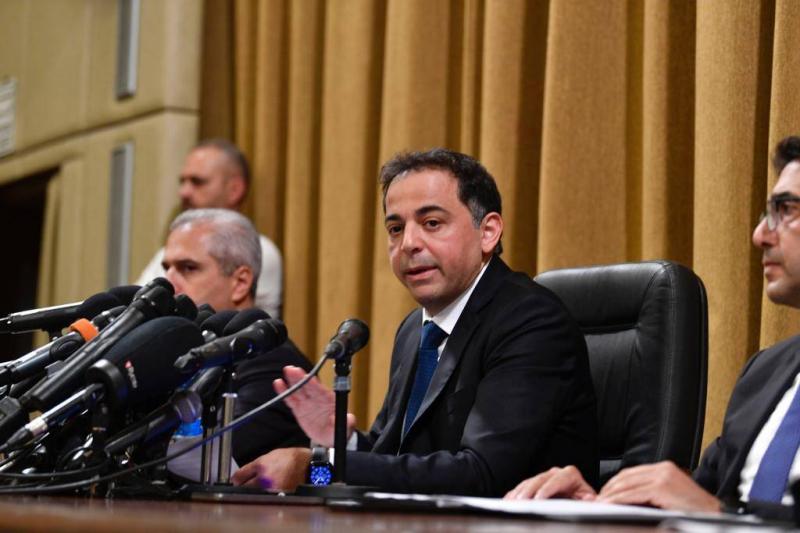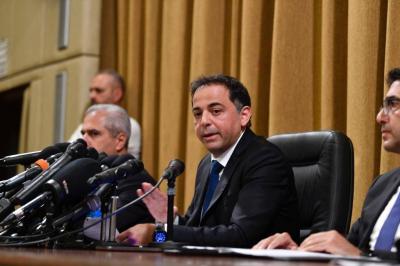The acting governor of the Central Bank of Lebanon, Wassim Mansouri, expressed hope that "we will start a joint workshop to provide answers regarding deposits, as someone is responsible for this delay." He clarified that "the central bank is a strong institution and is reviewing its internal mechanism, and it deserves the trust of citizens," affirming that "the entity that ensures salaries for employees is the state." In a speech following his meeting with the Economic and Social Council, he mentioned, "I have not held a press conference this month because I have nothing to add on the subject of reforms; the repeated calls for reforms become populist, and I refuse to launch populist slogans."
He discussed some headlines regarding the past period, stating, "The Lebanese state will continue to pay public sector salaries in US dollars. We, as the Central Bank of Lebanon, agree to this mechanism from a purely monetary perspective. This ensures social and living stability for about 400,000 families and maintains monetary stability." He confirmed that "these payments are entirely from the Lebanese state and its revenues." He stated, "Since August 1, 2023, the Central Bank has not issued a single dollar to finance the Lebanese state and will not issue any funding at all." Mansouri pointed out, "We are freezing the financial situation while waiting for solutions to the economic crisis, but this is not sustainable, and it is not right for the central governor not to have an answer for citizens regarding their deposits. We can provide answers if we work hand in hand."
During the meeting with the Economic and Social Council, Mansouri confirmed that "the lira will not be printed to finance the state, nor will treasury bonds be issued," stressing that "funding the state in dollars is out of the question." He explained that "the state will not be able to return depositors' funds before restructuring the banks," noting that "the banking sector must be relaunched by restoring depositor trust."
Charles Arbid, President of the Economic and Social Council, described the meeting with Mansouri as "transparent and realistic," praising his participatory approach with productive forces. He mentioned that many issues and concerns were raised, stating, "We care greatly about monetary stability, which is one of our priorities, in addition to restoring trust related to politics." He emphasized the need to start approving reform laws in Parliament while considering the pressing social situation.
Addressing the central governor, Deputy Fared Bustani stated, "Your presence in the Parliament greatly encourages me, as we have not been able to communicate with the previous Central Bank governor for a long time, and today you are calling for laws to be passed by Parliament. We have two laws that we have discussed, the first regarding borrowing in dollars and repaying loans in dollars, and the second concerning Electricité du Liban, which involves converting its revenues to dollars to purchase fuel. Indeed, Parliament is doing its work in this regard, and we hope for more cooperation between us."
In a related context, Mansouri met with Judge Claude Karam, President of the National Anti-Corruption Commission, and members of the commission, submitting his financial disclosure statement following his assumption of the acting governorship of the Central Bank. After the meeting, Mansouri stated, "I am honored to be in this commission, which forms a complete complementarity with oversight bodies, especially the Special Investigation Commission at the Central Bank, hoping for close and fruitful cooperation between us and them, especially as there is a common goal between the National Anti-Corruption Commission and the Central Bank. The issue of combating corruption is not just about pursuing individuals but about rescuing a nation; corruption does not benefit someone financially, but the bigger problem with corruption is that it harms economic stability, the development of any country, and the trust of citizens in their government. For this reason, there should be no leniency at all regarding corruption." He wished for this national commission to be provided with the full capacities it needs to launch its work completely, as failing to provide the required resources means that the previous mindset, which is distant from accountability, still prevails.
Mansouri added, "If we truly want to restore citizens' trust, we are obligated today to show citizens that all oversight institutions, foremost among them the Anti-Corruption Commission, must be given all necessary means to launch their work." He confirmed that "our first cooperation will be on recent cases, whether the 'Alvarez and Marsal' file or any other file, and the next session with the commission will be at the Central Bank in the Special Investigation Commission where we will sign a joint protocol for cooperation on this matter."
Commenting on Mansouri’s remarks, MP Ghada Ayyoub, a member of the "Strong Republic" bloc, stated via her account on "X": "Despite the acting governor of the Central Bank, Wassim Mansouri, confirming that 'the lira will not be printed to finance the state, nor will treasury bonds be issued, and funding the state in dollars is not on the agenda,' the government celebrates its achievements in the budget and confirms in the 2023 and 2024 budgets the funding of the state through treasury bonds by a decision of the Minister of Finance."




